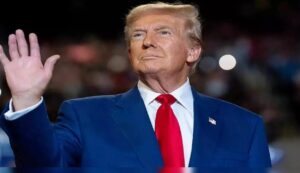Donald Trump’s plan could have a dramatic impact on Texas economy

One of the main tenets of Trump’s victorious 2024 presidential campaign was his promise to take tough measures against illegal immigration to the United States. According to data from the Bureau of Labor Statistics’ most recent demographic census, the number of illegal migrants in the nation increased by 800,000 from July 2022 to July 2023, with an estimated 11.7 million people residing there.
Ray Perryman, CEO of the financial research company The Perryman Group, told the media that Texas will be “disproportionately affected” by the action. “If 25 percent tariffs on all goods from Mexico and Canada were to be implemented and maintained, we estimate that the annual losses to the U.S. economy would be about $250.6 billion in annual gross domestic product (2024 dollars) and about 1.97 million jobs,” the founder claimed, citing a Perryman Group study that will be released next week. Nearly 1% of the US GDP is lost as a result.
“Because of its proximity to and integration of supply chains with Mexico, Texas would see a disproportionate impact, which we estimate to be about $46.9 billion in yearly gross state product (about 1.7 percent of the total) and approximately 370,000 jobs.”
Perryman went on to say that the “adverse effects would increase” if Trump’s tariffs caused Mexico or Canada to impose retaliatory tariffs or if they caused inflation that raised interest rates.
A prolific author and nonresident senior scholar at the independent think tank Peterson Institute for International Economics, Gary Clyde Hufbauer, said that Texas would be severely impacted by the proposed tariffs.
Speaking to Newsweek, he stated: “Texas would be negatively impacted by a trade war with Mexico. In addition to the rising cost of goods like beer, tequila, avocados, and mangos for Texans, many Texans will lose their jobs as a result of the drop in cross-border train and truck traffic. Additionally, Texas is losing sales to Mexico of consumer products, livestock, gas, petroleum, and power. Added to that is a drop in Mexican travel to Texas.
Economist and Ginn Economic Consulting founder Vance Ginn encouraged Trump to rescind his tariff threats in an interview with Newsweek.
He declared, “Using tariffs to raise taxes is an expensive error that harms Americans and impedes economic expansion. Texas, the country’s top trade state with Canada and Mexico, would be disproportionately harmed by a 25 percent tax on products from these nations because it would increase prices for consumers and companies, disrupt supply networks, and lower economic efficiency.
“Billions of dollars’ worth of products and services were imported and exported by Texas to Mexico and Canada in 2023, a crucial commerce that sustains a large number of Texas employment. Government-imposed tariffs that are used for protectionism disrupt markets, limit competition, and raise costs for Americans.
According to Maxwell Marlow, director of research at the Adam Smith Institute, a British think tank that promotes free markets and focuses on economic issues, Trump’s proposal will probably result in retaliatory tariffs on Texas, he told Newsweek.
“Don’t be fooled,” he said. If Donald Trump’s tariffs are implemented, American customers will be responsible for paying the increased costs of commonplace items. Instead of allowing inflation to return via unfair trade policies, Americans turned to the ballot to fight it.
“America’s exports and productivity might be weakened if retaliatory tariffs from its trade partners worsen the situation. For regions like Texas, where products cross borders many times throughout manufacture, this would be especially disastrous. Raising food prices for the sake of antiquated 18th-century mercantilist notions is not in the best interests of workers; thus, the government should refrain from interfering in complex supply networks.
According to Texas A&M University economics professor Dennis Jansen, who spoke to Newsweek, Mexico is “Texas’s number one trading partner,” making up 29% of the state’s exports.
In addition to stating that tariffs will “raise prices for consumers,” he added that “since Texas is a large exporting state, it may well have a stronger impact in Texas.”
Jansen continued: “If there is retaliation from abroad—say if Mexico follows through on the threat to raise tariffs on goods exported from the U.S. to Mexico—this will further reduce the demand for Texas (and overall U.S.) exports.”
Trump backer and billionaire hedge fund manager Bill Ackman, however, backed Trump’s tariff ideas on X, calling them “a weapon to achieve economic and political outcomes that are in the best interest of America, fulfilling his America first policy.”
“To be clear,” said Ackman. “According to Trump, the 25 percent tariffs will not be implemented, or if implemented, will be removed, once Mexico and Canada stop the flow of illegal immigrants and fentanyl into the U.S.”
Trump claimed that Mexican President Claudia Sheinbaum had “agreed to stop migration through Mexico” in response to the tariff threat during their conversation on Wednesday.
Sheinbaum, however, provided an alternative interpretation of the discussion, adding: “We reiterate that Mexico’s position is not to close borders but to build bridges between governments and between peoples.”
“Happy Thanksgiving!” was all that Trump transition spokesman Steven Cheung had to say when Newsweek reached out to him for comment on November 28.